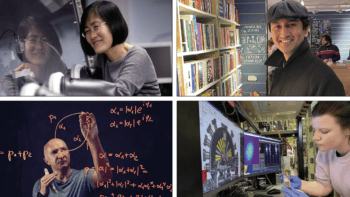Havovy Cama is the global purchasing skills-development and training manager at Cummins, where she develops online e-learning resources for purchasing professionals

What sparked your initial interest in physics?
I remember seeing the launch of the first Space Shuttle on TV while growing up in Mumbai, India, and from then on I was intrigued to learn more about space. To nurture this interest, my mother used to take me to see shows at the planetarium in Mumbai, and when Halley’s comet was close to the Earth in the late-1980s, we would wake up early in the morning to view it. Later, when I was doing my bachelor’s degree in physics at St Xavier’s College in Mumbai, I used to join its Natural Science Association’s annual trips to view the Perseid meteor showers from a remote location away from city lights. A college professor introduced me to two well-known astronomers at the Tata Institute of Fundamental Research in Mumbai. They kindly guided me through two separate literature surveys: one on the solar neutrino problem and another on life on other planets in our solar system. Surprisingly, some facts on the latter topic are making news in the media in the last couple of years.
I then was lucky to get a scholarship to study astrophysics at the University of Cambridge in the UK. I spent my first summer holidays at the Royal Greenwich Observatory helping astronomers with data analyses. Although I enjoyed working there, I realized that I did not wish to pursue this work in my career as I did not enjoy working on my own. The MSc course in physics of semiconductor materials science at the University of Bristol introduced me to transmission and scanning electron microscopy techniques, which I used for both my MSc and PhD theses. This expertise was also useful while I was a materials scientist at Alcan Laboratories in Banbury and for a short time at Innoval Technology, also in Banbury.
Did you ever consider a permanent academic career in materials science?
I used to get very frustrated when my academic supervisors and research associates constantly corrected the grammar in my theses and academic publications. This meant that later, I hated writing articles for publication. This put me off being an academic even though I still enjoyed teaching.
What made you want to do an MBA and what career path did you follow after?
I have always enjoyed learning new skills in my spare time and had completed evening classes in Banbury on car maintenance for women and flower arranging. While browsing the Open University catalogue in the late-1990s, I found a course that was very similar to an MBA. As I was self-funding my studies initially, a colleague encouraged me to undertake a distance-learning MBA at a more prestigious place, the Warwick Business School, as the costs were not too dissimilar. I thoroughly enjoyed what I was learning and also started applying some of the knowledge at work. I soon decided to step out of R&D to find a job in the “real world”, which also enabled me to earn more money. I know that money is not important in life, but it does help to have choices.
Although I had a lot of transferable skills, it was very hard to find an opportunity for a career change. I was exceedingly lucky that one hiring manager identified my skills and gave me a role as a business analyst in what was then called Holset Engineering, now known as Cummins Turbo Technologies in Huddersfield, West Yorkshire. I could do all the assigned tasks with great ease as they comprised data analyses.
After a few years at the company, I had the opportunity to become a Six Sigma Black Belt (an internationally recognized qualification in continuous improvement, designed for people whose job involves training or implementing process change). I then joined the purchasing department and become part of their “functional excellence” team. This role enabled me to build on my passion for business-process improvements and training. It also tapped into my materials science background as I developed a material compliance process. I had trained people in industry and academia while I was a materials scientist, and had also developed online aluminium metallurgy courses as part of a European aluMATTER project.
For the past 15 months, I have been responsible for global training of purchasing staff at Cummins. As part of my role I develop online courses for self-study too.
What were some of the challenges in moving from academia to industry?
To be honest I would not say it was a challenge at all. The only difference I observed initially was how punctual meetings were in an industrial environment, compared with a research organization. I still have the same freedom to plan my work as I did in research.
Having been in employment for almost 25 years, working life has changed considerably during this period. I do enjoy the ability to work flexibly these days, especially as I have stakeholders around the world and often have to work in the evening.
What does your current role at Cummins entail?
I am currently responsible for providing training options for all purchasing staff in Cummins globally. The company encourages staff to spend at least 5% of their time on training. Also, like many industries, we are continuously experiencing change and often it feels like trying to hop on a moving bus while riding a bicycle. As new processes and tools are brought into the department or as people change roles, they require training.
I believe in creating training options that people can tap into whenever they need and have the time for it, rather than making it mandatory. I offer blended training options: instructor-led classroom training, which at times is also broadcast using teleconference tools to make it a virtual offering, as well as online self-study courses and “office open hours” for some topics when people need ad hoc assistance.
While I am helping my colleagues to learn new things, I am also constantly learning about new purchasing processes and tools, learning methodologies and useful skills, such as the art of negotiation. I thoroughly love what I do, and often lose track of time, especially when I am working from home where there are no distractions around me.
How has your physics background been helpful in your work, if at all?
My scientific training has taught me to question to gain clarity, and to have attention to detail. Physics training generally goes hand-in-hand with some level of maths and statistics, which I have used at so many stages in my career. My materials science knowledge has helped me understand the need for material compliance in products and allowed me to develop a process that is now widely used in Cummins.
Do you have any advice for today’s students?
I would encourage today’s students to follow their passion and not follow the herd. If you enjoy what you do, success will automatically follow. Whenever you can, try and focus on emerging technologies and get your teeth into learning more about them. Remember that you will spend a large proportion of your waking hours at work, so it is extremely important that you enjoy whatever you are doing. Careers take time to develop, and you need to be patient and proactive.
Whenever possible volunteer for difficult tasks at work – the ones others are scared to undertake for fear of failure. Get summer placements and check out different career options in a safe environment. If you are lucky, your employer may sponsor part of your tuition fees or offer you full-time employment after you graduate.



